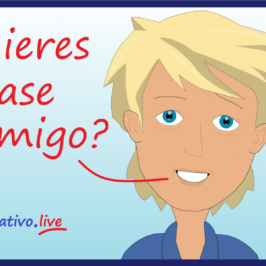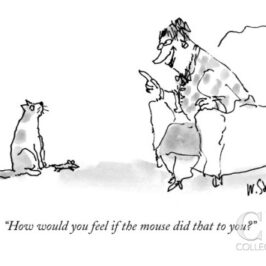Let’s start off with some examples of the different conditionals:
- ZERO CONDITIONAL: General Truth / Verdades Generales:
If you study, you’ll pass (Si estudias, apruebas)
- FIRST CONDITIONAL: Possible Future Situations
If you study, you will pass (Si estudias, aprobarás)
- SECOND CONDITIONAL: Hypothetical Situations
If you studied, you would pass (Si estudiaras, aprobarías)
- THIRD CONDITIONAL: Past Hypothetical Situations
If you had studied, you would have passed (Si hubieras estudiado, habrías aprobado)
Now let’s look into each one:
1st Cond.= If + present, will + infinitive
The First Conditional is for POSSIBLE FUTURE situations.
“If he knows, he’ll tell you.” or “he’ll tell you if he knows” ‘ll = WILL = Si lo sabe, te dirá (o, Te dirá si lo sabe)
You can use ‘WHEN’ instead of ‘IF’, for example: WHEN he knows, he’ll tell you (=CUANDO él sepa, te lo dirá) Another option is ‘UNLESS’ = ‘Al menos que’. For example: UNLESS she invites me, I will stay at home (= Al menos que me invita, me quedaré en casa)
You can replace ‘WILL’ with other modals such as: ‘WON’T’ (negative), ‘MIGHT (not)’ (= perhaps/maybe), ‘CAN’ or ‘CAN’T’, ‘MUSTn’t’ or ‘SHOULDn’t’, or (don’t or doesn’t) HAVE TO. If you need to learn more about these modals, click here.
So all of these sentences are first conditional:
- We can’t go to the beach if it rains.
- If you explain what’s happening, I might know the solution.
- I must finish this – unless my boss tells me to stop.
- When you see Sarah, you have to tell her I phoned.
Some important notes:
- Notice that the modal (will, won’t, can….) is the opposite side of the sentence to IF, WHEN or UNLESS. If you remember this, you won’t make this mistake:
If I will start working, I’ll earn some money.
- The first conditional is the most complicated for two reasons: (1) There are a lot of options – if, when, can, must, etc…. (2) People often forget the ‘-S’ when speaking abpout ‘he’, ‘she’ or ‘it’:
When Juan comeS, we’ll eat out in the best restaurant.
- If there is an imperative (¡Sientate! No hagas eso, Ven mañana) there is no modal:
If you see Sarah, TELL HER that I phoned.
2nd Cond= If + past, would + infinitive
The second conditional is for HYPOTHETICAL situations.
“If he knew, he’d tell you.” or “He’d tell you if he knew” ‘d = WOULD = Si lo supiera, te lo diría (Te lo diría si lo supiera)
This conditional is easy because there aren’t many options: IF + PAST, WOULD(n’t)
- If I were an animal I‘d be a cat, because I like sleeping.
- I wouldn’t go if it was raining.
- I‘d help you if I knew the answer.
3rd= If + had + participle, would have + participle
The third conditional is for PAST HYPOTHETICAL situations.
“If he had known, He’d have told you.” or “He’d have told you if he had known.” = Si el lo hubiera sabido, lo habría dicho / Te lo habría dicho si lo hubiera sabido
REMEMBER: ‘Had’ (Hubiera) is always with IF. ‘Would have’ (Habría) is always on the other side of the sentence.
- If I‘d known, I wouldn’t have invited him
- The police wouldn’t have caught the criminal if the plane hadn’t been delayed.
You can change ‘would’ for ‘might’ if you want to say ‘perhaps’:
- England might have won the World Cup if they had had better players.
There is also a mixed conditional, but I speak more about that in the links below / También existe un ‘Condicional Mezcla’, pero hablo más de eso en los enlaces aquí:
Here there are more complete explanations and exercises to practise your conditionals:
- Videotutorial + pdf. decargable + Ejercicio de Listening + Ejercicio escrito
- Complete Article on 0, 1, 2, 3 and Mixed Conditionals – with exercises
EXERCISE (Answers below)
Change from 1st to 2nd and then to third conditional:
Answers!
- 2nd Cond.= If I won the lottery, I’d give my teacher a present
- 3rd Cond.=If I had won the lottery , I would have given my teacher a present.
- 2nd Cond.= If he didn’t invite me, I wouldn’t talk to him anymore
- 3rd Cond.= If he hadn’t invited me, I wouldn’t have talked to him anymore
- 2nd Cond.= I’d see her if she came
- 3rd Cond.= I would have seen her if she had come.
4. We would have gone to the beach if it hadn’t rained.
- 2nd Cond. = We would go to the beach if it didn’t rain (wasn’t raining)
- 1st Cond. = We’ll go to the beach if it doesn’t rain.
- 2nd Cond. = If we lost the dog I would cry
- 1st Cond. = If we lose the dog I’ll cry.
- 2nd Cond. = If she failed her exams she’d spend all summer studying
- 1st Cond. = If she fails her exams she’ll spend all summer studying






